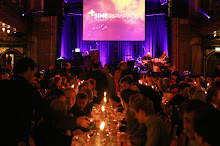
I had a an interesting cup of tea with Danah Boyd, who is a PhD student atthe School of Information at Berkeley and a Fellow at the Harvard Berkman Center for Internet and Society.
To listen to Danah is like being showered with interesting thoughts and perspectives and a fast track to understanding more than what you see on the surface. (A lot like SIME actually.) While most people are joining the choir singing the online networks gospel or admiring their own newly pimped profile Danah is a lot more critical.
Danah provoked strong reactions from the blogosphere and from traditional media alike when she came out with an article claiming that social software in general and Facebook and Myspace in particular creates a new class society, while at the same time reinforcing the old working class vs upper class polarization (read her papers at http://www.zephoria.org/).
In Danahs view Myspace is the home for the working class which is shown not only by what people are doing for a living but also through things like interests and the manner by which the myspaces pages look (read: bling bling). Myspace pages can be the show stopper at job interviews or can even be the cause of the myspacer getting fired. Facebook on the other side, grew from the elite at Harvard, to capturing large parts of the college scene to becoming the social network of choice for academics and for the privileged class. On Facebook the well todo display academic merits, an international network, openness and a modern mindset that alongside impeccable grades and/or an evident silver spoon close at hand enforces the overall profile of the Facebooker.
Many of the critics of Danahs thesis, maybe including the companies themselves, seem to misunderstand the implications of her statements and interpreted them as Myspace having a tougher future ahead when the truth might be the opposite in a world where the rich and successful are a scarce minority in comparison with the overwhelming minority of consumption ready masses.

In Danahs vision of the future, both of the companies and many other fast growing social networks will face trouble. The notion of having everyone in the same social space is not so easy in practise. One example is what she calls the parent-child phenomena. For a 16 year old daughter the mere thought of having her mother seeing her drunk on photos from a party she should not even have had when the parent where gone is as disturbing as it is for the mother to have her daughter seeing her unorthodox sexual preferences or way of interacting with other grown-up´s.
When looking at the phenomena as such, social networks will embark on a new even more mass market oriented journey once the recipe of getting into the handsets is figured out. Today the lack of interoperability between carriers and handset manufacturers makes it virtually impossible for social media to interact in a meaningful way besides the call and the sms. This change will not come until the Telco’s change attitude or until WiFi or other technologies can bypass the existing oligopolies. Before that will happen Danah has most likely ventured far from the self publishing worlds where everyone craves 15 bytes of fame into another intriguing area that she describes as her pet-obsession: the Saudi funded rural schools in neighbouring Arab countries.
Published by Ola Ahlvarsson
When looking at the phenomena as such, social networks will embark on a new even more mass market oriented journey once the recipe of getting into the handsets is figured out. Today the lack of interoperability between carriers and handset manufacturers makes it virtually impossible for social media to interact in a meaningful way besides the call and the sms. This change will not come until the Telco’s change attitude or until WiFi or other technologies can bypass the existing oligopolies. Before that will happen Danah has most likely ventured far from the self publishing worlds where everyone craves 15 bytes of fame into another intriguing area that she describes as her pet-obsession: the Saudi funded rural schools in neighbouring Arab countries.
Published by Ola Ahlvarsson

No comments:
Post a Comment